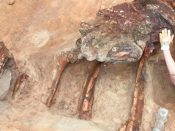Por Gunjan Tyagi (Department of Chemical Engineering, Imperial College London, United Kingdom).
Surfactants play a pivotal role in a wide array of industrial and scientific applications, spanning from pharmaceutical formulations and agrochemicals to cosmetics. Their versatile properties are highly dependent on their ability to interact synergistically, either with each other or with other chemical components, to achieve desired performance outcomes. The talk will explore the fundamental principles and applications of surfactant synergy and performance, shedding light on the intricate interplay between surfactant molecules and their cooperative effects. In our study we examined the interactions between a model anionic and amphoteric surfactant pair in aqueous solution as a function of composition, at floating and fixed pH, employing a combination of experimental and theoretical approaches. An extensive series of pure and mixed ratios of sodium dodecyl sulfate (SDS) and N,N-dimethyldodecylamine N-oxide (DDAO) were investigated for various interaction parameters at fixed and floating pH. Reduction of pH however induced the formation of precipitate depending upon the molar ratio of mixed surfactant solutions. Overall, our findings demonstrate a pronounced synergistic interaction between SDS and DDAO, arising from diminished electrostatic and steric repulsions and enhanced lateral surfactant packing. The findings contribute to the evaluation of mixed surfactant performance and underlying mechanisms, which is essential for the development of efficient and effective surfactant formulations, which requires the selection of synergistic surfactant pairs and the optimization of their composition ratio to achieve the desired functionality. In parallel, our research also addresses the pressing need for effective cleaning and disinfection strategies in the context of the COVID-19 pandemic. A novel approach involving light-induced conformational changes in photo-surfactants (PS) is presented. These PS, mimicking common surfactants like CTAB, exhibit potential antimicrobial/viral potential. Such light-activated surfactants with enhanced performance can pave the way for the next generation of smart anti-microbial cleaning formulations, with profound health and well-being benefits.






















